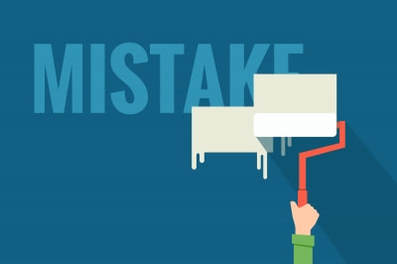 Image courtesy of bplanet at FreeDigitalPhotos.net Image courtesy of bplanet at FreeDigitalPhotos.net While traveling through Alaska a couple of years back we received shoddy service at the hotel restaurant (cold food, lengthy waiting times and some items on the menu out of stock). The following morning I dropped an item on the bedroom floor. When bending down to pick it up, I glanced under the bed and was appalled to see a thick layer of dirt, a used tissue, and a discarded plastic cup – obviously, no one had bothered to clean under the bed for months. Closer inspection of the rest of the room revealed more dust and dirt. This wasn’t a cheap hotel, and they were serving dozens of guests every day. Now I believe in reporting a problem to management, so before checking out I asked to see the manager. I told him what I had seen in the room and offered to show him my room. He declined the offer. I was given a sad story about how difficult it was to get good help and that this was the start of the summer season. My wife and I were each given fifty dollar vouchers. I really didn’t get the impression that anything was going to change at the establishment which was owned by a large company, so I sent a complaint to their office. Several months later I received a call from a junior representative to ask me some questions, they undertook to forward my complaint and gave me another fifty-dollar voucher. That was the last I heard about the matter. Now I often submit reviews on TripAdvisor, both good and bad. This hotel got a poor review from me. I was fascinated to see that several months after my review was posted other reviews featured similar complaints, so obviously, no one bothered to take my comments seriously. Recently I stayed at a guest lodge in Johannesburg, and was appalled at how dirty the room was; black mold all over the shower, dust, and dirt everywhere torn bath mat, cigarette burn in the sheet (and no this wasn’t some cheap boarding house but a supposedly upmarket hotel). Needless to say, my review was not favorable. The management did reply to my review and said the guest lodge was undergoing an upgrade and I was welcome to return when it was complete, and I would receive a complimentary night’s accommodation. Really, the hotel is undergoing upgrades and this was the excuse for a dirty room, ragged bath mat, etc. I’ve noticed recently that many companies offer a bottle of wine, voucher, or gift to customers that complain. This seems like a bribe to me. Here is something for free, now go away and stop complaining. But I’m not complaining to get a free gift, rather I’m complaining so that action can be taken to improve the situation so that the following customers get better service than me. In construction, things will go wrong. We will have unhappy customers. Customers will complain. In fact, I welcome customers’ complaints. At least it means they are still talking to us rather than customers talking with their feet. The first we know they are unhappy is when they don’t return – then it’s too late. We’ll never see them again, we’ll never get the chance to convince them that we can do better, and we’ve probably upset other customers in the meantime with the same fault. So how should we respond to customer complaints? Well, I think the first thing is to listen to them. Often managers try and interrupt customers, argue with them, or make excuses – even blaming others. Invariably this makes the customer more irate. No matter how annoyed the customer is, let them get the problem out. In fact, offer to take them to some chairs so you can discuss the problem and you’ll often find they eventually run out of steam. Just the act of sitting down and listening quickly deflates them. It’s important to acknowledge the problem, even if it seems trifling to you. Understand what the problem is. Outline what steps you will take to correct the problem. Even follow up with the customer later (a telephone call or email) to tell them what has been implemented to correct the problem and prevent the problem from recurring. Equally important is to ensure that the problem has in fact been corrected. Complaints and problems that are ignored can quickly upset an unhappy customer even further. But more importantly, as long as the problem isn’t sorted there will invariably be more unhappy clients. As a manager, it’s easy to make excuses, or blame others. But, is an angry client really interested in excuses? As management, we need to realise that we are responsible for those that are working for us. If they aren’t doing what they should be, then it reflects on us. Sure, we can’t be everywhere all the time, but it is our responsibility to ensure that those working for us understand what’s expected from them and that they have the skills and resources to deliver. It does mean that we should be continually checking on people and processes to ensure they are all performing correctly, and making appropriate changes when there’s a problem. Sure there are some customers who will complain about nothing. But make sure that you do investigate the problem to ensure there isn’t an underlying problem that you missed. In fact, often a problem, such as poor quality or rude service, is indicative of poor management. If management is slipping up on the basics of quality management they could be slipping up elsewhere, and before you know it the project is losing money. Sometimes the problem isn’t attributable to your company at all. Maybe the client has unreasonable expectations, they were expecting marble floor tiles and not ceramic ones. Well, explain to them that they are only paying for ceramic tiles and that’s what was in the specifications. Equally important is to ensure that your client has reasonable expectations. Don’t advertise yourself as a five-star hotel if you are a boarding house. Don’t advertise that your client will receive a luxury home when they won’t be. Of course, the fact that the house isn’t a luxury house should never be an excuse for poor quality. No matter what the price of the project, the client has a right to expect a quality build. Sure, cheaper projects may be smaller and have lesser specifications, but a cheap price should never be an excuse for poor quality workmanship or substandard materials. Sometimes the problem may be due to a design fault. If the designers are appointed by the client then point out why the problem isn’t yours, but offer advice on what steps the client could take to rectify the problem where possible. Always try and be understanding. Clients have usually paid lots of money and they expect to receive a quality product and value for their money. Conclusion ....Continue Reading.....  This article was first published on the ClockShark website. To visit this website and continue reading the article click on the link above. Please share this post To read more about the author’s books and find out where you can purchase them visit the pages on this website by clicking the links below: 'Successful Construction Project Management: The Practical Guide' 'Building a Successful Construction Company: The Practical Guide' 'Construction Claims: A Short Guide for Contractors' 'Construction Project Management: Tips and Insights' 'Construction Management: From Project Concept to Completion' 'Construction Book reviews' To read more about the author visit the page 'Paul Netscher' Want to contact Paul Netscher please enter your details on 'Contacts' Find out how Paul Netscher can help you construction management construction project management
1 Comment
4/2/2022 06:13:53 pm
Nice Post! Many property owners are experiencing significant damages to their homes and other belongings. A Property Damage Restoration company can help you with the necessary repairs so you can get your life back on track. If your home or business have been damaged due to storm damage, fire, or some other catastrophic event, contact experts.
Reply
Leave a Reply. |
Archives
June 2024
Note: We welcome genuine comments, especially comments that add additional information to the subject matter in the article. We however reserve the right to remove inappropriate comments, which includes comments that have nothing to do with the subject, comments that include inappropriate language, and comments that are an advertisement for a product or company, or which include an advertising link. Comments must be in English. We will not enter into discussion on why a particular comment was removed.
CategoriesCopyright 2016 - The attached articles cannot be reproduced for commercial purposes without the consent of the author.
The opinions expressed in the attached articles are those of the writer. It should be noted that projects are varied and different laws and restrictions apply which depend on the location of the contractor and the project. It's important that the reader uses the supplied information taking cognisance of their particular circumstances. The writer assumes no responsibility or liability for any loss of any kind arising from the reader using the information or advice contained herein. "I have what I consider some of the best books on construction management."
Books are available from: Amazon.com Amazon.co.uk takealot.com kalahari.com Amazon.in Amazon.de Amazon.fr Amazon.it Amazon.com.au Powell's Fishpond uread bokus Amazon.ca Amazon.es Other retail stores Available in paperback or on Kindle "28 YEARS OF CONSTRUCTION PROJECT MANAGEMENT EXPERIENCE, DEVELOPING SUCCESSFUL CONSTRUCTION PROJECT MANAGERS AND BUILDING SUCCESSFUL CONSTRUCTION COMPANIES"
|



 RSS Feed
RSS Feed




